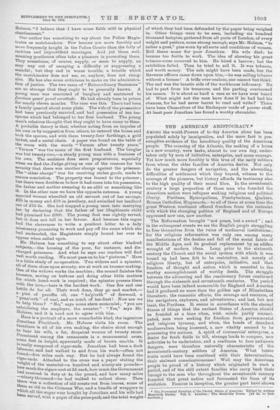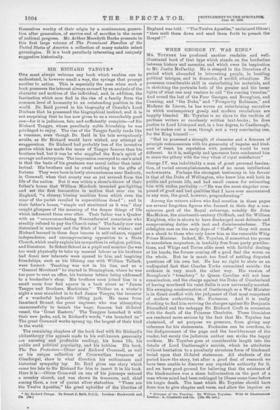THE AMERICAN ARISTOCRACY.* AMONG the world-Powers of to-day America alone
has been populated solely by immigration, and the mere fact is pre- sumptive evidence of the hereditary quality of the American people. The crossing of the Atlantic, the making of a home in a new country, were tasks, almost to our own day, under- taken only by men of initiative, enterprise, and some courage.
Yet how much more forcibly is this true of the early settlers from whom the older families of America derive. Not only do the greater dangers of navigation, and the abounding difficulties of settlement which they braved, witness to the courage of the pioneers, but history affords its testimony also to the high quality of their moral fibre. In the seventeenth century a large proportion of those men who founded the American nation were refugees seeking religious and political liberty. Puritans, Episcopalians, Presbyterians, Quakers, Roman Catholics, Huguenots,—to all of them at some time the great Western continent offered freedom from the restraint with which the changing politics of England and of Europe oppressed now one, uow another.
The Reformation brought "not peace, but a sword" ; and in the subsequent events we see the English people struggling to free themselves from the ruins of mediaeval institutions ; for the religious reformation was only one among many manifestations of the decline and fall of the social fabric of the Middle Ages, and its gradual replacement by an edifice wrought of modern ideas. Long prior to the sixteenth century the Church and the social system with which it was bound up had been felt to be restrictive, not merely of religions liberty, but of enterprise, initiative, and that freedom of thought and action which is essential to the worthy accomplishment of worthy deeds. The struggle between the advancing and the reactionary forces continued through the sixteenth and seventeenth centuries. The period would have been indeed memorable for England and America had it produced no more than the golden age of Elizabethan literature ; the romantic efforts, the courage and resource, of the navigators, explorers, and adventurers ; and last, but not least, the- Puritans. It seems in accordance with the eternal fitness of things that the earliest States of America should be founded at a time when, with minds, partly emanci- pated, men were seeking for freedom from governmental and religious tyranny, and when, the bonds of decadent mediaevalism being loosened, a new vitality seemed to be possessing the nations. A spirit of commercial enterprise, a desire for fresh fields to till, strange lands to conquer, new activities to be undertaken, and a readiness to face unknown dangers, were therefore naturally characteristic of . the seventeenth-century settlers of America. What better traits could have been combined with their determination, their stalwart conscientiousness ! Well may the American people be proud of a history which originated in such a period, and of the still extant families who carry back their lineage to the men who throughout the seventeenth century founded that great nation and forecasted the lines of its evolution. Famous in inception, the greater part have shown
• The Prominent Families of the United States of America. Edited by Arthur Meredyth Burke. Vol. L Irondoul The Saukville Prose. [22 Ss. to Sub- themselves worthy of their origin by a continuance, genera- tion after generation, of service and of sacrifice in the cause of national progress. Mr. Arthur Meredyth Burke presents in this first large volume of The Prominent Families of the United States of America a collection of many notable select genealogies. It is a book peculiarly interesting and uniquely suggestive historically.



























































 Previous page
Previous page